- Home
- Sue Grafton
T Is for Trespass
T Is for Trespass Read online
T IS FOR TRESPASS
ALSO BY SUE GRAFTON
Kinsey Millhone mysteries
A is for Alibi
B is for Burglar
C is for Corpse
D is for Deadbeat
E is for Evidence
F is for Fugitive
G is for Gumshoe
H is for Homicide
I is for Innocent
J is for Judgment
K is for Killer
L is for Lawless
M is for Malice
N is for Noose
O is for Outlaw
P is for Peril
Q is for Quarry
R is for Ricochet
S is for Silence
T IS FOR TRESPASS
SUE GRAFTON
a marian wood book
Published by G. P. Putnam’s Sons a member of Penguin Group (USA) Inc.
New York
A Marian Wood Book
Published by G. P. Putnam’s Sons
Publishers Since 1838
a member of the Penguin Group
Penguin Group (USA) Inc., 375 Hudson Street, New York, NY 10014, USA • Penguin Group (Canada), 90 Eglinton Avenue East, Suite 700, Toronto, Ontario M4P 2Y3, Canada (a division of Pearson Penguin Canada Inc.) • Penguin Books Ltd, 80 Strand, London WC2R 0RL, England • Penguin Ireland, 25 St Stephen’s Green, Dublin 2, Ireland (a division of Penguin Books Ltd) • Penguin Group (Australia), 250 Camberwell Road, Camberwell, Victoria 3124, Australia (a division of Pearson Australia Group Pty Ltd) • Penguin Books India Pvt Ltd, 11 Community Centre, Panchsheel Park, New Delhi–110 017, India • Penguin Group (NZ), 67 Apollo Drive, Rosedale, North Shore 0632, New Zealand (a division of Pearson New Zealand Ltd) • Penguin Books (South Africa) (Pty) Ltd, 24 Sturdee Avenue, Rosebank, Johannesburg 2196, South Africa
Penguin Books Ltd, Registered Offices: 80 Strand, London WC2R 0RL, England
Copyright © 2007 by Sue Grafton
All rights reserved. No part of this book may be reproduced, scanned, or distributed in any printed or electronic form without permission. Please do not participate in or encourage piracy of copyrighted materials in violation of the author’s rights. Purchase only authorized editions.
Published simultaneously in Canada
Library of Congress Cataloging-in-Publication Data
Grafton, Sue.
T is for trespass / Sue Grafton.
p. cm.––(Kinsey Millhone mysteries)
“A Marian Wood book.”
ISBN: 1-4295-4396-5
1. Millhone, Kinsey (Fictitious character)––Fiction. 2. Women private investigators––California––Fiction. 3. Caregivers––Fiction. 4. Psychopaths––Fiction. 5. California––Fiction. I. Title.
PS3557.R13T15 2007 2007029368
813'.54––dc22
This is a work of fiction. Names, characters, places, and incidents either are the product of the author’s imagination or are used fictitiously, and any resemblance to actual persons, living or dead, businesses, companies, events, or locales is entirely coincidental.
While the author has made every effort to provide accurate telephone numbers and Internet addresses at the time of publication, neither the publisher nor the author assumes any responsibility for errors, or for changes that occur after publication. Further, the publisher does not have any control over and does not assume any responsibility for author or third-party websites or their content.
For Elizabeth Gastiger, Kevin Frantz,
and Barbara Toohey,
with admiration and affection
CONTENTS
ACKNOWLEDGMENTS
PROLOGUE
1 SOLANA
2 DECEMBER 1987
3 SOLANA
4
5
6
7
8
9
10 SOLANA
11
12
13
14
15
16
17 SOLANA
18
19
20
21
22
23
24 SOLANA
25
26
27
28
29
30
31 SOLANA
32
33
34
35
EPILOGUE
ACKNOWLEDGMENTS
The author wishes to acknowledge the invaluable assistance of the following people: Steven Humphrey; Joe B. Jones, pharmacist (retired); John Mackall, Counselor-at-Law, Seed Mackall LLP; Dan Trudell, President, ARS, Accident Reconstruction Specialists; Robert Failing, M.D., forensic pathologist (retired); Sylvia Stallings and Pam Taylor of Sotheby’s International Realty; Sally Giloth; Barbara Toohey; Greg Boller, Deputy District Attorney, Santa Barbara County District Attorney’s Office; Randy Reetz, Santa Barbara Chamber of Commerce; Sam Eaton, Attorney, Eaton & Jones, Attorneys at Law; Ann Cox; Ann Marie Kopeikan, Director of Vocational Nursing, Lorraine Malachak, Nursing Programs Support Specialist, and Eileen Campbell, Administration, Santa Barbara City College; Christine Estrada, Santa Barbara County Court Administrator, Superior Court Information Records & Filing; Liz Gastiger; Boris Romanowski, Parole Agent, State of California Department of Corrections; Lynn McLaren, private investigator; Maureen Murphy, Maureen Murphy Fine Arts; Laurie Roberts, photographer; and Dave Zanolini, United Process Servers.
T IS FOR TRESPASS
PROLOGUE
I don’t want to think about the predators in this world. I know they exist, but I prefer to focus on the best in human nature: compassion, generosity, a willingness to come to the aid of those in need. The sentiment may seem absurd, given our daily ration of news stories detailing thievery, assault, rape, murder, and other treacheries. To the cynics among us, I must sound like an idiot, but I do hold to the good, working wherever possible to separate the wicked from that which profits them. I know there will always be someone poised to take advantage of the vulnerable: the very young, the very old, and the innocent of any age. I know this from long experience.
Solana Rojas was one…
1
SOLANA
She had a real name, of course—the one she’d been given at birth and had used for much of her life—but now she had a new name. She was Solana Rojas, whose personhood she’d usurped. Gone was her former self, eradicated in the wake of her new identity. This was as easy as breathing for her. She was the youngest of nine children. Her mother, Marie Terese, had borne her first child, a son, when she was seventeen and a second son when she was nineteen. Both were the product of a relationship never sanctified by marriage, and while the two boys had taken their father’s name, they’d never known him. He’d been sent to prison on a drug charge and he’d died there, killed by another inmate in a dispute over a pack of cigarettes.
At the age of twenty-one, Marie Terese had married a man named Panos Agillar. She’d borne him six children in a period of eight years before he left her and ran off with someone else. At the age of thirty, she found herself alone and broke, with eight children ranging in age from thirteen years to three months. She’d married again, this time to a hardworking, responsible man in his fifties. He fathered Solana—his first child, her mother’s last, and their only offspring.
During the years when Solana was growing up, her siblings had laid claim to all the obvious family roles: the athlete, the soldier, the cutup, the achiever, the drama queen, the hustler, the saint, and the jack-of-all-trades. What fell to her lot was to play the ne’er-do-well. Like her mother, she’d gotten pregnant out of wedlock and had given birth to a son when she was barely eighteen. From that time forward, her progress through life had been hapless.
Nothing had ever gone right for her. She lived paycheck to paycheck with nothing set aside and no way to get ahead. Or so her siblings assumed. Her sisters counseled and advised her, lectured and cajoled, and finally threw up their hands, knowing she was never going to change. Her brothers expressed exasperation, but usually came up with money to bail her out of a jam. None of them understood how wily she was.
She was a chameleon. Playing the loser was her disguise. She was not like them, not like anyone else, but it had taken her years to fully appreciate her differences. At first she thought her oddity was a function of the family dynamic, but early in elementary school, the truth dawned on her. The emotional connections that bound others to one another were absent in her. She operated as a creature apart, without empathy. She pretended to be like the little girls and boys in her grade, with their bickering and tears, their tattling, their giggles, and their efforts to excel. She observed their behavior and imitated them, blending into their world until she seemed much the same. She chimed in on conversations, but only to feign amusement at a joke, or to echo what had already been said. She didn’t disagree. She didn’t offer an opinion because she had none. She expressed no wishes or wants of her own. She was largely unseen—a mirage or a ghost—watching for little ways to take advantage of them. While her classmates were self-absorbed and oblivious, she was hyperaware. She saw everything and cared for nothing. By the age of ten, she knew it was only a matter of time before she found a use for her talent for camouflage.
By the age of twenty, her disappearing act was so quick and so automatic that she was often unaware she’d absented herself from the room. One second she was there, the next she was gone. She was a perfect companion because she mirrored the person she was with, becoming whatever they were. She was a mime and a mimic. Naturally, people liked and trusted her. She was also the ideal employee—responsible, uncomplaining, tireless, willing to do whatever was asked of her. She came to work early. She stayed late. This made her appear selfless when, in fact, she was utterly indifferent, except when it was a matter of furthering her own aims.
In some ways, the subterfuge had been forced on her. Most of her siblings had managed to put themselves through school, and at this stage in their lives they appeared more successful than she. It made them feel good to help their baby sister, whose prospects were pathetic compared with their own. While she was happy to accept their largesse, she didn’t like being subordinate to them. She’d found a way to make herself their equal, having acquired quite a bit of money that she kept in a secret bank account. It was better they didn’t know how much her lot in life had improved. Her next older brother, the one with the law degree, was the only sibling she had any use for. He didn’t want to work any harder than she did and he didn’t mind bending the rules if the payoff was worthwhile.
She’d borrowed an identity, becoming someone else on two previous occasions. She thought fondly of her other personas, as one would of old friends who’d moved to another state. Like a Method actor, she had a new part to play. She was now Solana Rojas and that’s where her focus lay. She kept her new identity wrapped around her like a cloak, feeling safe and protected in the person she’d become.
The original Solana—the one whose life she’d borrowed—was a woman she’d worked with for months in the convalescent wing of a home for seniors. The real Solana, whom she now thought of as “the Other,” was an LVN. She, too, had studied to become a licensed vocational nurse. The only difference between them was that the Other was certified, while she’d had to drop out of school before she’d finished the course work. That was her father’s fault. He’d died and no one had stepped forward to pay for her education. After the funeral, her mother asked her to quit school and get a job, so that was what she’d done. She found work first cleaning houses, and later as a nurse’s aide, pretending to herself that she was a real LVN, which she would have been if she’d finished the program at City College. She knew how to do everything the Other did, but she wasn’t as well paid because she lacked the proper credentials. Why was that fair?
She’d chosen the real Solana Rojas the same way she’d chosen the others. There was a twelve-year difference in their ages, the Other being sixty-four years old to her fifty-two. Their features weren’t really similar, but they were close enough for the average observer. She and the Other were roughly the same height and weight, though she knew weight was of little consequence. Women gained and lost pounds all the time, so if someone noticed the discrepancy, it was easily explained. Hair color was another insignificant trait. Hair could be any hue or shade found in a drugstore box. She’d gone from a brunette to a blonde to a redhead on previous occasions, all of which were in stark contrast to the natural gray hair she’d had since she was thirty.
Over the past year, she’d darkened her hair little by little until the match with the Other was approximate. Once, a new hire at the convalescent home had mistaken the two for sisters, which had thrilled her to no end. The Other was Hispanic, which she herself was not. She could pass if she chose. Her ethnic forebears were Mediterranean; Italians and Greeks with a few Turks thrown in—olive-skinned and dark-haired, with large dark eyes. When she was in the company of Anglos, if she was quiet and went about her business, the assumption was that she didn’t speak much English. This meant many conversations were conducted in her presence as though she couldn’t understand a word. In truth, it was Spanish she couldn’t speak.
Her preparations for lifting the Other’s identity had taken an abrupt turn on Tuesday of the week before. On Monday, the Other told the nursing staff she’d given two weeks’ notice. Soon her classes were starting and she wanted a break before she devoted herself to school full-time. This was the signal that it was time to put her plan into operation. She needed to lift the Other’s wallet because a driver’s license was crucial to her scheme. Almost as soon as she thought of it, the opportunity arose. That’s what life was like for her, one possibility after another presenting itself for her personal edification and advancement. She hadn’t been given many advantages in life and those she had, she’d been forced to create for herself.
She was in the staff lounge when the Other returned from a doctor’s appointment. She’d been ill some time before, and while her disease was in remission, she’d had frequent checkups. She told everyone her cancer was a blessing. She was more appreciative of life. Her illness had motivated her to reorder her priorities. She’d been accepted to graduate school, where she would study for an MBA in health care management.
The Other hung her handbag in her locker and draped her sweater over it. There was only the one hook, as a second hook had a screw missing and dangled uselessly. The Other closed her locker and snapped shut the combination lock without turning the dial. She did this so it would be quicker and easier to pop the lock open at the end of the day.
She’d waited, and when the Other had gone out to the nurse’s station, she’d pulled on a pair of disposable latex gloves and given the lock a tug. It hadn’t taken any time at all to open the locker, reach into the Other’s bag, and remove her wallet. She’d slipped the Other’s driver’s license from its windowed compartment and put the wallet back, reversing herself as neatly as a strip of film. She peeled off the gloves and tucked them into the pocket of her uniform. The license she placed under the Dr. Scholl’s pad in the sole of her right shoe. Not that anyone would suspect. When the Other noticed her license was gone, she’d assume she’d left it somewhere. It was always this way. People blamed themselves for being careless and absentminded. It seldom occurred to them to accuse anyone else. In this case, no one would think to point a finger at her, because she made such a point of being scrupulous in the company of others.
To execute the remaining aspect of the plan, she’d waited until the Other’s shift was over and the administrative staff were gone for the day. All the front offices were empty. As was usual on Tuesday nights, the office doors were left unlocked so a cleaning crew could come in. While they were hard at work, it w
as easy to enter and find the keys to the locked file cabinets. The keys were kept in the secretary’s desk and needed only to be plucked up and put to use. No one questioned her presence, and she doubted anyone would remember later that she’d come and gone. The cleaning crew was supplied by an outside agency. Their job was to vacuum, dust, and empty the trash. What did they know about the inner workings of the convalescent wing in a senior citizens’ home? As far as they were concerned—given her uniform—she was a bona fide RN, a person of status and respect, entitled to do as she pleased.
She removed the application the Other had filled out when she applied for the job. This two-page form contained all the data she would need to assume her new life: date of birth, place of birth, which was Santa Teresa, Social Security number, education, the number of her nursing license, and her prior employment. She made a photocopy of the document along with the two letters of recommendation attached to the Other’s file. She made copies of the Other’s job evaluations and her salary reviews, feeling a flash of fury when she saw the humiliating gap between what the two of them were paid. No sense fuming about that now. She returned the paperwork to the folder and replaced the file in the drawer, which she then locked. She put the keys in the secretary’s desk drawer again and left the office.
2

 S Is for Silence
S Is for Silence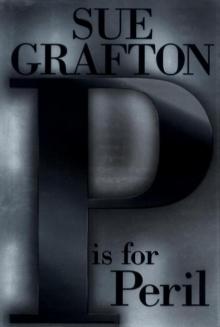 P Is for Peril
P Is for Peril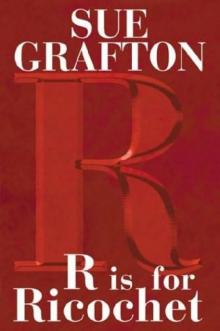 R Is for Ricochet
R Is for Ricochet J Is for Judgment
J Is for Judgment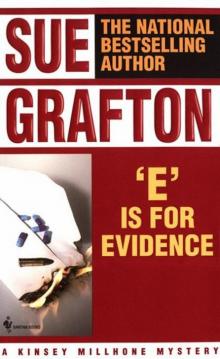 E Is for Evidence
E Is for Evidence T Is for Trespass
T Is for Trespass C Is for Corpse
C Is for Corpse U Is for Undertow
U Is for Undertow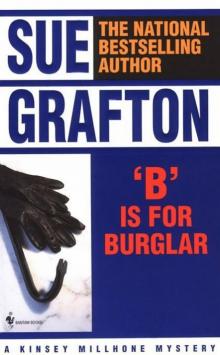 B Is for Burglar
B Is for Burglar Four Sue Grafton Novels
Four Sue Grafton Novels D Is for Deadbeat
D Is for Deadbeat K Is for Killer
K Is for Killer I Is for Innocent
I Is for Innocent A Is for Alibi
A Is for Alibi F Is for Fugitive
F Is for Fugitive Q Is for Quarry
Q Is for Quarry W Is for Wasted
W Is for Wasted Kinsey and Me: Stories
Kinsey and Me: Stories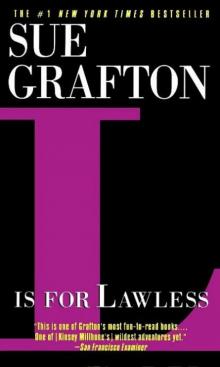 L Is for Lawless
L Is for Lawless Y Is for Yesterday
Y Is for Yesterday G Is for Gumshoe
G Is for Gumshoe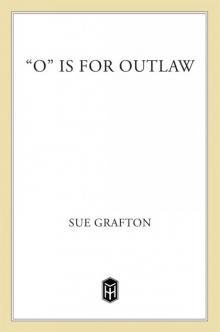 O Is for Outlaw
O Is for Outlaw H Is for Homicide
H Is for Homicide X
X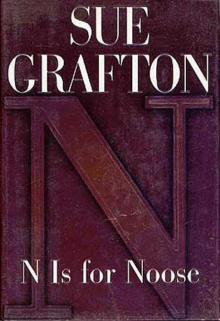 N Is for Noose
N Is for Noose Three Complete Novels: A Is for Alibi / B Is for Burglar / C Is for Corpse
Three Complete Novels: A Is for Alibi / B Is for Burglar / C Is for Corpse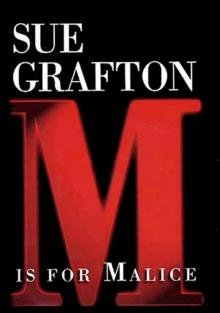 M Is for Malice
M Is for Malice I is for INNOCENT
I is for INNOCENT G is for GUMSHOE
G is for GUMSHOE K is for KILLER
K is for KILLER S is for SILENCE
S is for SILENCE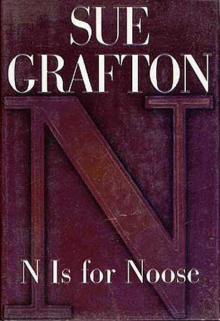 N is for NOOSE
N is for NOOSE D is for DEADBEAT
D is for DEADBEAT V is for Vengeance
V is for Vengeance U is for Undertow
U is for Undertow W Is for Wasted km-23
W Is for Wasted km-23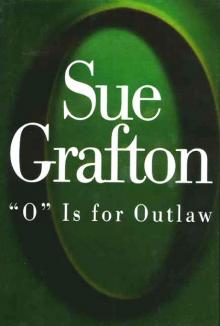 O is for OUTLAW
O is for OUTLAW H is for HOMICIDE
H is for HOMICIDE Sue Grafton Novel Collection
Sue Grafton Novel Collection Kinsey and Me
Kinsey and Me C is for CORPSE
C is for CORPSE F is for FUGITIVE
F is for FUGITIVE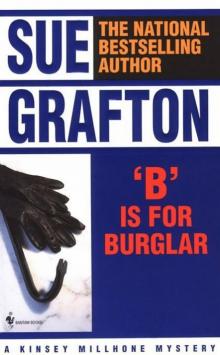 B is for BURGLAR
B is for BURGLAR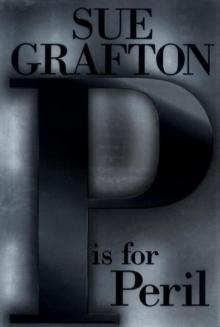 P is for PERIL
P is for PERIL A is for ALIBI
A is for ALIBI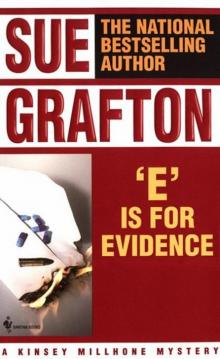 E is for EVIDENCE
E is for EVIDENCE J is for JUDGMENT
J is for JUDGMENT Q is for QUARRY
Q is for QUARRY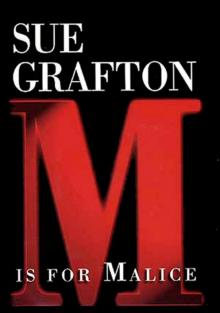 M is for MALICE
M is for MALICE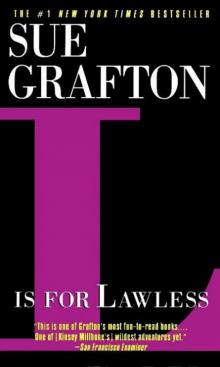 L is for LAWLESS
L is for LAWLESS